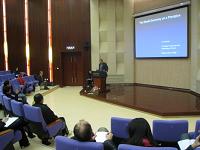{
"authors": [
"Uri Dadush"
],
"type": "event",
"centerAffiliationAll": "dc",
"centers": [
"Carnegie Endowment for International Peace",
"Carnegie Europe"
],
"collections": [],
"englishNewsletterAll": "asia",
"nonEnglishNewsletterAll": "",
"primaryCenter": "Carnegie Endowment for International Peace",
"programAffiliation": "AP",
"programs": [
"Asia"
],
"projects": [],
"regions": [
"North America",
"United States",
"East Asia",
"China",
"Eastern Europe",
"Western Europe"
],
"topics": [
"Economy",
"Foreign Policy",
"EU"
]
}
The Threat of Protectionism During the Financial Crisis
Thu, March 12th, 2009
Beijing
IMGXYZ1178IMGZYXUri Dadush, Director of Carnegie’s International Economics Program, was in Beijing on March 12-13 to discuss the threat of protectionism during the global financial crisis and share his views on China’s potential role. His visit came at a particularly relevant time, with recent reports indicating a trend towards protectionism.
Meeting with the China Reform Forum
On his first full day in Beijing, Mr. Dadush met with members of the China Reform Forum (CRF), including CRF Vice President Huang Fanzhang, former executive director for China in the International Monetary Fund (1985-86). He opened his discussion by assessing the current global financial situation and outlining his predictions for the world economy in the coming months. Mr. Dadush cited the drops in Chinese export figures (down 27% year-on-year) as well as world GDP to underline his doubt that there would be a recovery in the fourth quarter of 2009. Indeed, he believes that there has been a collapse in world economic activity. He argued that the upcoming G-20 meeting must focus on halting the contraction as opposed to reforming the financial architecture.
Five Areas of Focus
Dadush outlined five areas to which world leaders need to devote more attention:
- Fiscal Stimulus: Europe has not contributed enough, the US is doing enough for now, and some Asian countries have contributed far more than others. Dadush said that Japan has been contributing sufficiently thus far, but that China’s stimulus package cannot be assessed with much accuracy because the numbers are still unclear.
- Monetary Policy: Interest rates are extremely low right now on account of the loosening of monetary policy. Dadush called for the next steps to be quantitative easing and, with the resulting boost in the money supply, the purchase of assets from the private sector or Treasury.
- Taking Bad Assets from Banks: Although leaders should be prioritizing this area, it is the area where they have done the least, particularly in the US. Dadush recommended the creation of private-public partnerships that would compete for the purchase of assets. He conceded that executing this step would be complicated and could take too much time, with the result that bad banks may wind up being nationalized.
- Providing Support: Dadush called on stronger countries to aid vulnerable ones, specifically those in Eastern Europe. The International Monetary Fund (IMF) should provide them increased aid, and the IMF itself should receive more support. Japan has already lent the IMF $100 billion, and China should follow its lead.
- Stop Protectionism: China in particular has a stake in supporting measures to keep the trading system open. Dadush argued that the G-20 needs to agree on a few points. First, there needs to be a moratorium on trade restrictions until the end of 2010. Second, any changes in tariffs, subsidies, or other measures need to be reported to the World Trade Organization (WTO). The WTO should then put together a report for discussion at the G-20 meetings. Third, international industry councils should be created for important industries – for example, automotives. They would be able to exchange information on a timely basis and provide aid to industries in a transparent manner.
Questions and Answers
Dadush and CRF member took turns answering questions about the international monetary regime, the realities of the crisis, and China’s recent moves.
There are questions over whether China will contribute to the IMF without haggling over its voting share in the organization. Although all members agreed that the World Bank and the IMF need to give developing countries greater voting shares, Dadush said that countries should avoid political posturing and instead be generous and flexible.
There were also questions over the ability of the IMF to manage or halt the crisis effectively. Some participants wondered if supporting it would help end the crisis sooner, or if the crisis would eventually disappear naturally. Dadush strongly felt that the IMF has taken strong steps to contain the crisis. He said that it was morally, politically, and economically unacceptable to reject ailing individual countries because of a global financial crisis. The IMF provides a framework that requires sacrifice but provides confidence to the private sector. There is truth in the calls for change, but reform should come from within and should be implemented with patience. Lastly, Dadush tied China’s own economic future with the IMF’s viability during the crisis: China will be the biggest exporter in a matter of years, so it doesn’t want a “jungle” out there.
When asked about his predictions for China’s economy, Dadush said that its future growth will depend on its ability to absorb technology and sell sophisticated goods. In the next two to three years it has great room to expand domestically: China has low government debt, high reserves, and high savings. The real challenge will be domestic demand.
Tsinghua Talk and Other Meetings
Dadush spent the rest of his time in China at Tsinghua University and in meetings with various officials, academics, and business leaders. At Tsinghua Carnegie Beijing co-sponsored an abbreviated version of Dadush’s discussion with CRF, “The World Economy on a Precipice,” with the Nomura Research Institute (NRI)-China Research Center. Its contents were also discussed in meetings with Sun Yongfu, Director-General of the Department of European Affairs in the Ministry of Commerce; Tarhan Feyzioğlu, IMF Resident Representative; Michael Barbalas, American Chamber of Commerce (AmCham) President; and Ardo Hansson, a leading World Bank economist. Their discussions also examined the technical aspects of China’s fiscal stimulus package and explored what China can do to counter protectionism aggressively.
Dr. Barbalas noted that confidence among Chinese-based American companies is high despite the economic climate. Most companies have no plans to leave China according to recent AmCham surveys. They are also generally more optimistic than their US-based counterparts that their situations will improve sooner rather than later, perhaps because many see room to expand domestically and are turning their focus away from exports.
Conclusions
All of those with whom Dadush met agreed that the crisis is most likely to worsen in the coming months and that protectionism remains one of the biggest threats to the global economy during this time. Despite the general agreement, a recent report by the World Bank reveals that at least 17 out of the G-20 countries – including the US and China – have recently erected trade barriers or measures that will restrict foreign business. If Dadush is right, these steps will only prolong the length of the crisis and the pain that it causes. At the upcoming G-20 meeting, leaders must once again renew their pledge to fight protectionism and agree to mechanisms that will monitor and penalize protectionist measures.
Carnegie does not take institutional positions on public policy issues; the views represented herein are those of the author(s) and do not necessarily reflect the views of Carnegie, its staff, or its trustees.
